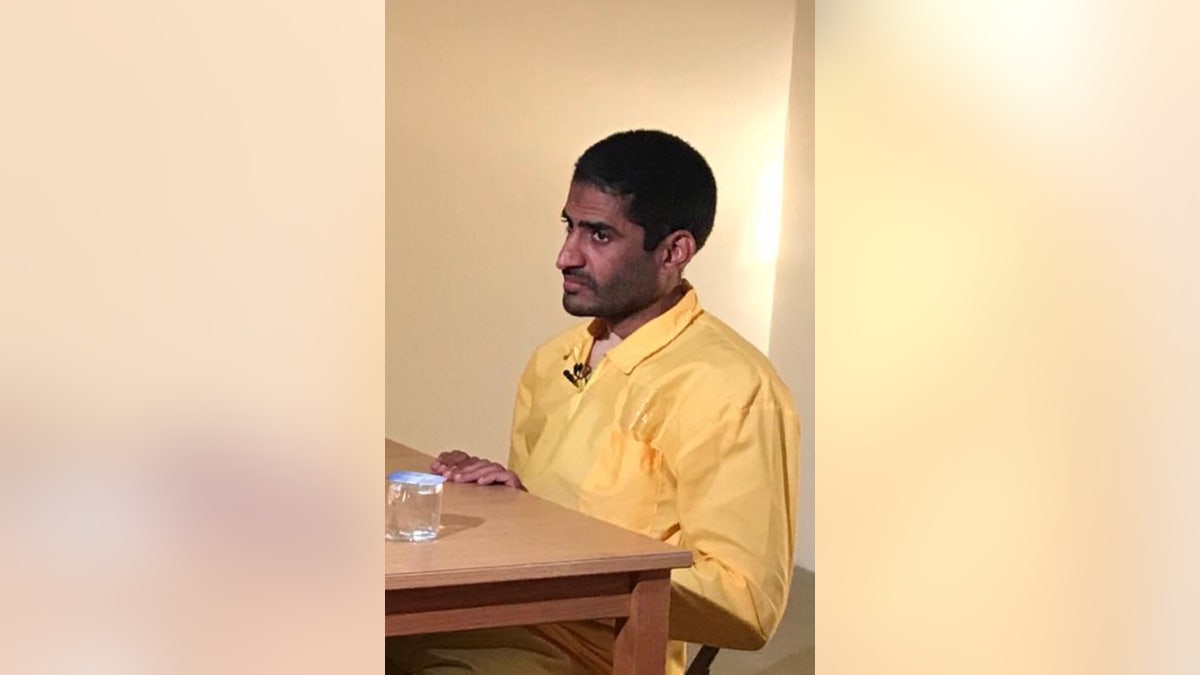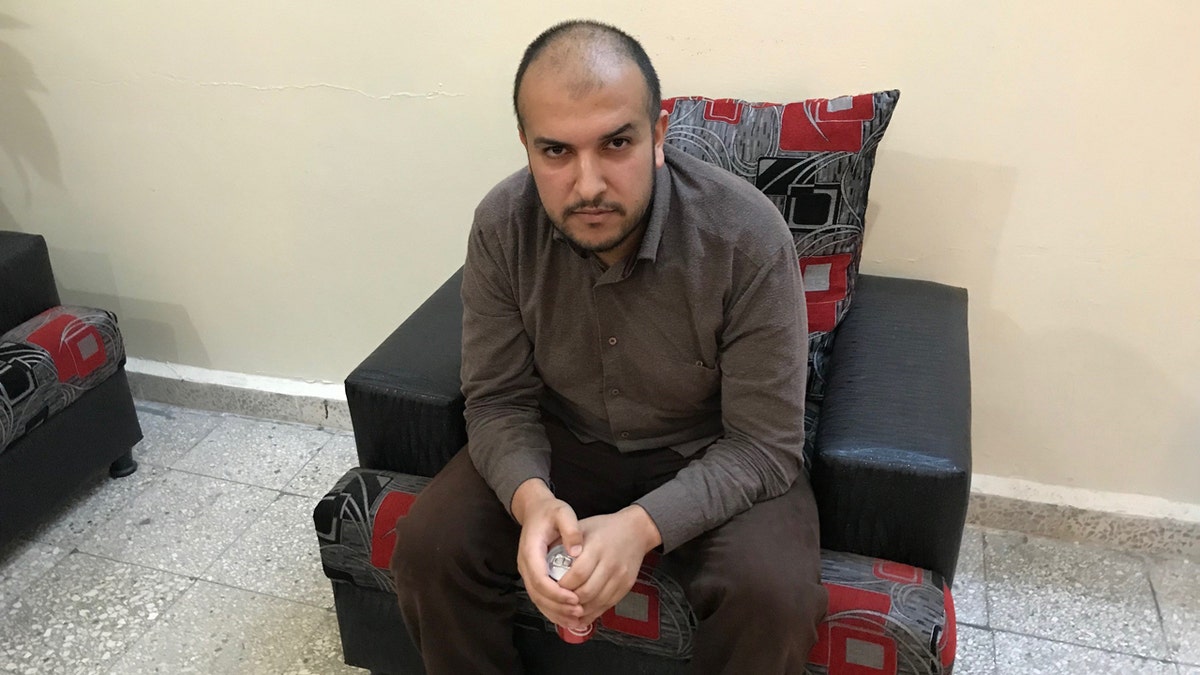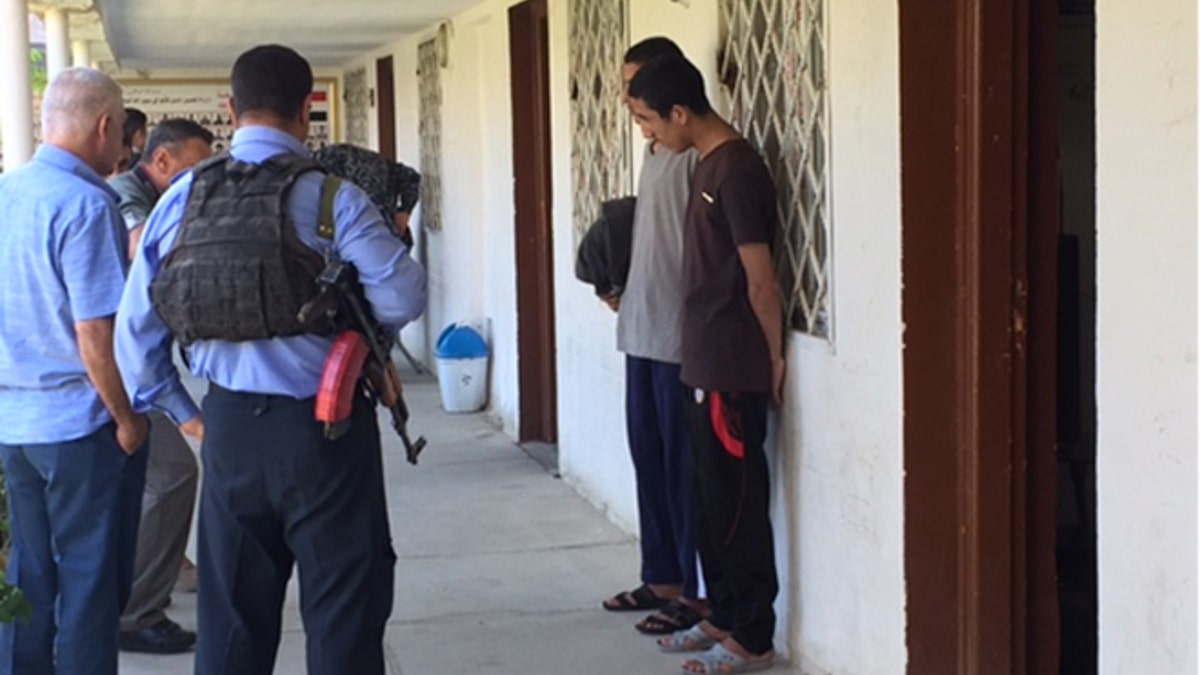
Sheikh Hussam Naji, recruited to be an assistant to ISIS leader in Mosul, remains behind bars (Ministry of Interior, Iraq)
Sheikh Hussam Naji thought his wildest dreams had come true when ISIS and its so-called “caliphate” captured huge swaths of Iraqi and Syrian territory in the summer of 2014.
“I believed in the ISIS thoughts, that we were the victory sect, and that we were the sect who would bring justice and the right principles to the world," said the 28-year-old Iraqi, who recently communicated with Fox News through a security official at an Interior Ministry prison, where Naji is being held.
But for the man who served briefly in the top echelon of the brutal terrorist organization - as a tribal leader focused on Iraq’s western Anbar province - before being personally appointed by ISIS boss Abu Bakr al-Baghdadi to be his assistant, the dream quickly morphed into a nightmare.
In August 2014, while en route to take up the post in the freshly captured city of Mosul, Naji was arrested by Iraqi authorities. He remains behind bars, has been given a death sentence, and is currently awaiting his turn in the appeals process.
“Now, myself and the other fighters, are shocked by the reality. ISIS has lost its power, it has been defeated,” he said. “A lot of the members were not educated. They were easily seduced by the ISIS thoughts about religion. These were not the correct principles, as ISIS went far away with its aggression and brutal acts.”
Despite his proclamations of remorse and regrets, prison officials remain skeptical. They still refer to Naji as a “very dangerous person” and keep him alone in a cell out of fear he will recruit other prisoners into extremism. Prison officials say he has the “ability to make people sympathize with his calls,” using verses from religious texts.
His days are spent alone, with the exception of regular visits from his immediate family – including four daughters and a five-year-old son.
Naji is said to proudly acknowledge his ability to persuade others to adhere to his convictions. He is, after all, believed to have been personally brought into the ISIS fold by his old “friend,” and the world’s most wanted man: Baghdadi.

Abu Bakr al-Baghdadi emerged in September 2014 to address ISIS supporters. (AP)
Naji claims to have first met the elusive leader in the U.S.-run Camp Bucca detention facility, in the south of Iraq, in 2004. The two were only together about a month, according to Naji, who described the ISIS commander as “very quiet. Did not talk much, and would keep silent for long periods of time.”
Baghdadi spent only 10 months behind bars. Naji was detained for three years, from 2004 to 2007. The two were both former al-Qaeda members.
Although born and raised in a Shia family, following the American invasion in 2003, Naji became more “radicalized,” and joined the Sunni terror group al Qaeda. He then called on fellow Iraqis to “kill the Americans,” and wage war against Iraqis who sided with them. That's what landed him in Bucca, security officials assert.
Naji was released and allegedly re-connected with Baghdadi – who he said had changed into a suddenly devout and strict man – and continued to recruit for Al Qaeda. That was before the shadowy leader later broke away, and formed ISIS.
Naji no longer identifies himself as an ISIS member. He is one of many who claim to have abandoned their pledges of allegiance to Baghdadi’s insurgency, and have become “depressed by the ISIS defeat,” given they were promised “the state of the Caliphate would never be defeated."
“They didn’t achieve their promises,” Naji lamented.
A U.S military official told Fox News an estimated 1,800 fighters remain holed up in Syria, in pockets close to the Iraqi border. That's a far cry from the more than 35,000 who joined ISIS in Iraq and Syria during the peak years between 2014-2016.
As for Baghdadi himself, his location and disposition remain the source of much speculation. He has yet to be found, but all indications suggest he is still alive, and in hiding.
FROM JAIL, REMORSEFUL EX-ISIS FIGHTER WARNS: GROUP WILL RETOOL AND RETURN
THE LIVES OF ISIS WIVES HELD IN SYRIA: INFIGHTING, JEALOUSY - AND REGRETS
thers joined – and renounced their membership – for reasons woven into the web of basic survival.
Other former ISIS fighters have renounced their membership in the group, many for reasons of basic survival.
Omar, 25-year-old from the Iraqi village of Dor Saladin, told Fox News he ended up in ISIS territory after fleeing an arranged marriage, and learning his wife “had something wrong with her head.” Believed to be responsible for the slaughter of some 70 Shia Muslims, Omar was told that if he wanted to stay in the area and protect his land, he needed to take up arms.
Living in fear ISIS leaders would turn their guns on him, he fled Mosul and attempted to “blend in and find work” in the northern Kurdish region of Iraq. But within weeks, he was identified and arrested by authorities.
Dawen, a then-19-year-old Kurdish fighter who went to Syria with a friend after being recruited by ISIS online, said he left after only a few weeks. His was prompted to leave after phoning his parents, who expressed their deep shame over what he had done.

ISIS bombmaker Jasim Mohammed Atti'ya (Hollie McKay/Fox News)
Then there was bomb-maker Emir Jasim, from the Kirkuk provincial city of Hawija, who quit only after being captured by Kurdish security. He confessed to having “cried like a big baby” to authorities.
A German native, Hamza, who told Fox News it was impossible to get out of ISIS after signing up, said his only choice was to surrender to the U.S.-backed Syrian Democratic Forces (SDF) earlier this year.

"ISIS is like the Mafia ... once you get in, you never come out," says German native Hamza Nmeie, a former fighter for the group. (Hollie McKay/Fox News)
Then there is the case of two Iraqi teen recruits, who explained they had signed up after being informed they would “go to the paradise” and would be greeted by the “many angel women waiting.” But the appeal wore thin after it became apparent their life amounted to little more than manning checkpoints.
Their boredom escalated, and they wanted out. So they traded in their ISIS life as child soldiers for a pair of handcuffs, in Iraqi custody.

Mostafa Qais Ahmed Dawood and Awad Arkan Helal Mohammed stand solemnly outside following their interrogation. (Hollie McKay/FoxNews.com)
Women fighters, too, have had their own reasons for abandoning ISIS.
One 54-year-old former Baath party member from Kirkuk, who can only be identified as KS, per Kurdish official request, told Fox News she joined initially in the hopes of being a suicide bomber. At the time she “hated” her life, she said, and claimed to have cancer. She eventually decamped to Turkey as a refugee, after getting cold feet before a mission that ended in arrest, when she was caught by an intelligence informant.
Another female who admitted to treating wounded ISIS fighters in the town of Qayarra vowed she had no choice but to join the force after it overran her town. She needed money to support her family, she said. But she told Fox News she eventually decided to leak information to Iraqi intelligence. She made a run for it after suspecting ISIS operatives found out she was snitching.

The main gate at the Women and Children's Prison of Erbil. (Photo: Hollie McKay/FoxNews.com)
Iraqi historian and researcher in extremism and security affairs, Hisham al Hashimi, laid out five central reasons why ISIS members leave the group.
“First, the thoughts and ideologies change from when they first joined – they start to see the ISIS thoughts are not correct. Second, they are not awarded the positions, and then are shocked when they don’t get it,” he said.
Third, ISIS leadership gave top positions to fighters from Saudi Arabia over Iraqis – so that caused regional and nationalism issues.” The fourth motive, according to Hashimi, is that members “became depressed” after realizing that they “could not achieve the ambitious goals.” The fifth and final was due to “exhaustion” from the continued, intense fighting.
Fadhel Abu Rageed, a Baghdad-based political and terrorism analyst, agreed internal squabbling, coupled with desolation, were the main reasons for ISIS defection.
“Most of the foreign fighters especially feel broken after the Iraqi victory but cannot return to their home countries,” Rageed noted. “Most of the Iraqi fighters said they were made to feel like second-class fighters, while the foreigners were superior, and got to be leaders.”
But there was one reason he was told by a now-detained ISIS member that surprised him the most.
“One handsome Iraqi fighter said he left because he missed women while he was alone fighting in the deserts,” Rageed said.

ISIS fighter in what was once their "caliphate" capital of Raqqa, Syria (Reuters)
And for many, observed Anne Speckhard – Director of the International Center for the Study of Violent Extremism (ICSVE) and Adjunct Associate Professor of Psychiatry at Georgetown University School of Medicine – quitting was spurred after witnessing “un-Islamic” things like as raping women and burning prisoners alive.
“But there were vast differences between foreign fighters and local fighters as reasons for joining,” Speckhard, who has interviewed more than 100 ISIS male and female defectors, said. “Most locals joined over local grievances – in Syria believing that ISIS could deliver them from Assad’s atrocities and in Iraq that a Sunni state could be established that would re-empower Sunnis.”
For the outsiders descending into the battlefield, the motivations stemmed from “believing in the ISIS dream of establishing a utopian Islamic State ruled by Islamic ideals.”
“Many followed friends into Syria and Iraq, some joined to prove their manhood, some were escaping problems at home, some came to marry, many were seeking adventure and some were seeking martyrdom,” Speckhard added. “Some were seeking power in ISIS. And some were pure and simple psychopaths.”








































